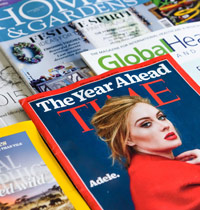Introduction
 Students benefit form studying the media because it teaches them about images and texts that they see every day and how we as audiences are manipulated and targeted. We hope that pupils can become savvier and more aware of this manipulation and the reasons behind it. We want students to be able to analyse media texts and write about them in a clear and coherent way. We want students to know how cultural, historical and political contexts affect the way the media represents ideologies and values and how their behaviour is influenced by what they see and read.
Students benefit form studying the media because it teaches them about images and texts that they see every day and how we as audiences are manipulated and targeted. We hope that pupils can become savvier and more aware of this manipulation and the reasons behind it. We want students to be able to analyse media texts and write about them in a clear and coherent way. We want students to know how cultural, historical and political contexts affect the way the media represents ideologies and values and how their behaviour is influenced by what they see and read.
The students start by studying such media texts before making some of their own products which allows them to apply their knowledge and understanding to their own work. This allows students to be creative as well as analytical and inspires many students to pursue a career in the media industry. As Liverpool is the 2nd most filmed city in the UK outside of London, this allows some students to follow their ambition into media production roles.
Staff
Mrs K Hudson - Head of Department
Ms A Kivi - teacher of Media
Ms Cameron - teacher of Media
Programme of Study KS4
Head of Department: Mrs K Hudson
Contact email address: hudsonk@broughtonhall.com
Specification: Eduqas
Qualification: GCSE Media Studies
 Media is about communication, particularly mass communication with lots of people. The media creates products that are designed to entertain and inform, created for lots of people to hear, watch or read, often at roughly the same time. Whenever you are watching television, streaming films, scrolling through social media or listening to a podcast, you are consuming media. The power that the media has is huge. Think about the idea that the average adult consumes media for almost 8 hours a day, and within that time, they are being bombarded by other people's ideas and opinions and images of the world and its people.
Media is about communication, particularly mass communication with lots of people. The media creates products that are designed to entertain and inform, created for lots of people to hear, watch or read, often at roughly the same time. Whenever you are watching television, streaming films, scrolling through social media or listening to a podcast, you are consuming media. The power that the media has is huge. Think about the idea that the average adult consumes media for almost 8 hours a day, and within that time, they are being bombarded by other people's ideas and opinions and images of the world and its people.
How someone responds to that will affect their ideas about people, places and society, of politics and culture, of themselves and of their place in the world. Doesn't that sound like something we should know more about?
How is the course structured & assessed?
As a GCSE Media Studies student, you will analyse how media products like TV programmes and music videos use images, sounds, language, and representations to create meaning. You will learn about the media industry and how the industry affects how media products are made. You will investigate media audiences, exploring who are the people who watch, read and consume the products, and considering how different people might be affected by media products differently, and why. You will study lots of different media forms, such as: There's also a significant amount of practical work where you might create music videos, magazines, television programmes, advertisements and more. In your practical work, you'll be able to apply what you've learned about the media in the production of your own media products.
This will enable learners to develop knowledge and understanding of a broad range of media forms and products, providing a comprehensive and balanced study of the media that encompasses audio-visual, print-based and online forms, as well as exploring the interrelationships between them.
Assessment will consist of a mixture of examinations and non-examined assessment.
Component 1: Written examination: 1 hour 30mins, 40% of qualification
Component 2: Written examination: 1 hour 30mins, 30% of qualification
Component 3: Non-exam assessment: Media Production, 30% of qualification
What can these qualifications lead to?
During the GCSE Media course you'll develop and practise a range of skills which will equip you for progression to A Level study. They will also help you hugely in other areas such as Film, English, Humanities and Social Sciences. Looking further ahead, over one hundred universities offer courses in Media, Communications and Cultural Studies in the UK. An A Level qualification in Media Studies, informed by study at GCSE level, helps you to move towards these courses, as well as to those in a range of other areas. If university isn't for you, there is a huge array of career opportunities in the media, and it's an industry that is growing very quickly.
If you are interested in the idea of a career in TV and film production, advertising, journalism, interactive media, and digital marketing, technical production, special effects, web design and post-production, then studying Media at GCSE level is a great place to start.
Programme of Study KS5
Key Information
Level: A Level
Examination Board: Eduqas
Subject Leader: Mrs Hudson
Entry Requirements
Grade 5 in English Literature or Language or Grade 4 if you studied GCSE Media Studies.
Why Choose this course?
The media play a central role in contemporary culture, society and politics. They shape our perceptions of the world through the representations, ideas and points of view they offer. The media have real relevance and importance in our lives today, providing us with ways to communicate, with forms of cultural expression and the ability to participate in key aspects of society.
The economic importance of the media is also unquestionable. The media industries employ large numbers of people worldwide and generate significant global profit. The globalised nature of the contemporary media, ongoing technological developments and more opportunities to interact with the media suggest their centrality in contemporary life can only increase.
Prospects
Possible career choices include: journalism, media production: TV/Radio/Print/Online, Public Relations, advertising and marketing, business.
Course Content
Component 1
Media Products, Industries and Audiences
Written examination: 2 hours 15 minutes
35% of qualification
Component 2
Media Forms and Products in Depth Written examination: 2 hours 30 minutes 35% of qualification
Component 3
Cross-Media Production Non exam assessment 30% of qualification
Learners study a range of media forms in terms of a theoretical framework which consists of media language, representation, media industries and audiences. The following forms are studied in depth through applying all areas of the framework: newspapers, magazines, television, online, social and participatory media. Advertising and marketing, film, music video, radio and video games are studied in relation to selected areas of the framework.
Course Opportunities/ Activities
Opportunities to attend film screenings, relevant art installations, the Brand Museum and the National TV and Film museum, as well as guest speakers from the media such as local radio and TV.
Support and Challenge
Some aspects of the course are more challenging such as applying theories accurately and analysing texts from the past and understanding their contextual background. The coursework element of the text allows students to express their creativity and students should be able to use the Adobe suite of software, such as Photoshop.
Student Comment
I love Media Studies because we debate issues in the news and have class discussions about contemporary and texts from the past, developing our confidence and knowledge of the world around us. It has also developed my creative skills as I can use software that I couldn't use before to make short films and magazines.

 Students benefit form studying the media because it teaches them about images and texts that they see every day and how we as audiences are manipulated and targeted. We hope that pupils can become savvier and more aware of this manipulation and the reasons behind it. We want students to be able to analyse media texts and write about them in a clear and coherent way. We want students to know how cultural, historical and political contexts affect the way the media represents ideologies and values and how their behaviour is influenced by what they see and read.
Students benefit form studying the media because it teaches them about images and texts that they see every day and how we as audiences are manipulated and targeted. We hope that pupils can become savvier and more aware of this manipulation and the reasons behind it. We want students to be able to analyse media texts and write about them in a clear and coherent way. We want students to know how cultural, historical and political contexts affect the way the media represents ideologies and values and how their behaviour is influenced by what they see and read.
 Media is about communication, particularly mass communication with lots of people. The media creates products that are designed to entertain and inform, created for lots of people to hear, watch or read, often at roughly the same time. Whenever you are watching television, streaming films, scrolling through social media or listening to a podcast, you are consuming media. The power that the media has is huge. Think about the idea that the average adult consumes media for almost 8 hours a day, and within that time, they are being bombarded by other people's ideas and opinions and images of the world and its people.
Media is about communication, particularly mass communication with lots of people. The media creates products that are designed to entertain and inform, created for lots of people to hear, watch or read, often at roughly the same time. Whenever you are watching television, streaming films, scrolling through social media or listening to a podcast, you are consuming media. The power that the media has is huge. Think about the idea that the average adult consumes media for almost 8 hours a day, and within that time, they are being bombarded by other people's ideas and opinions and images of the world and its people.